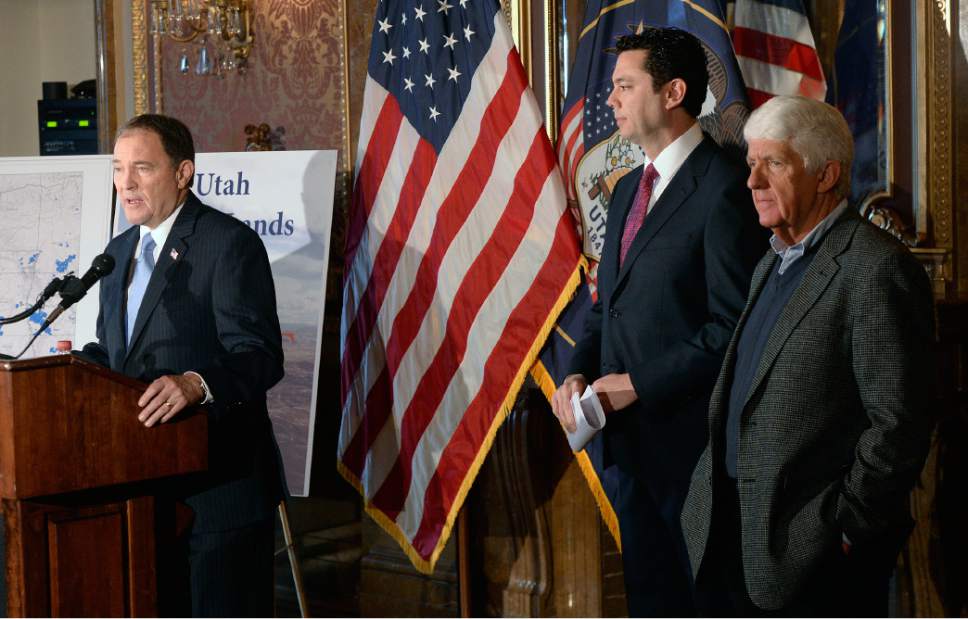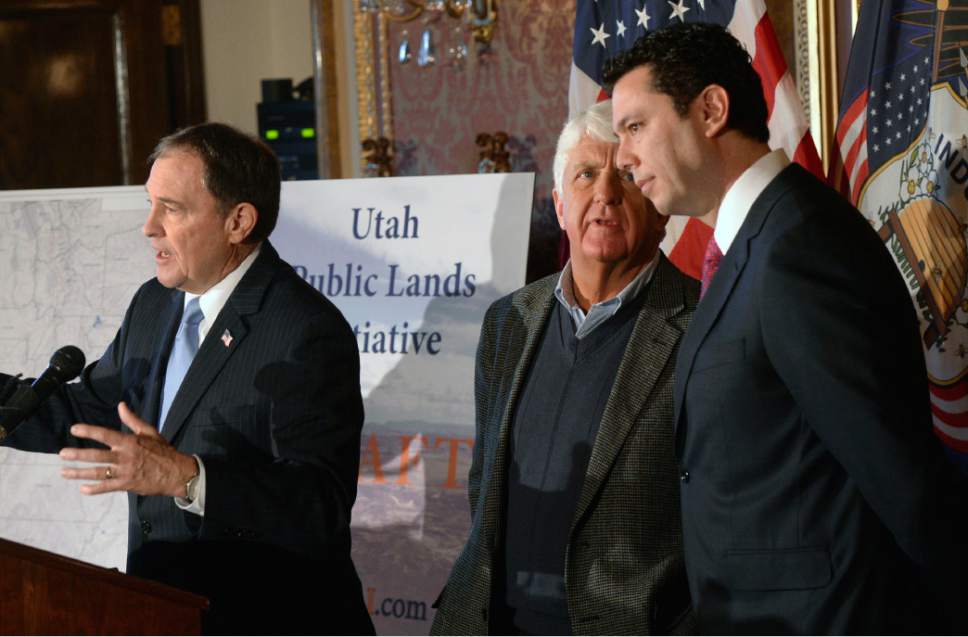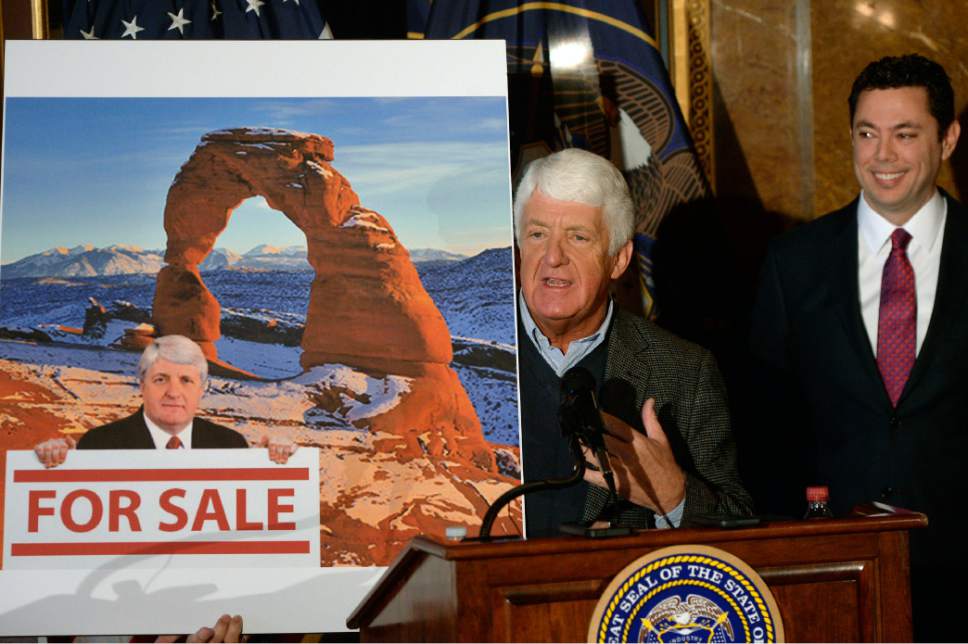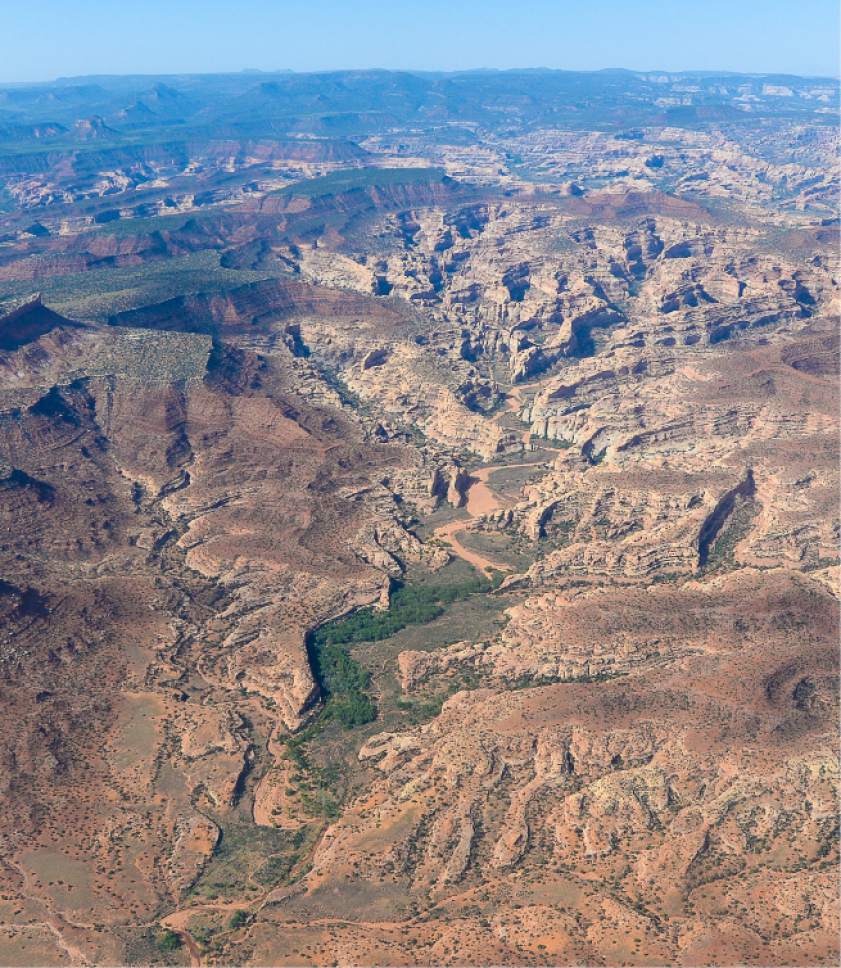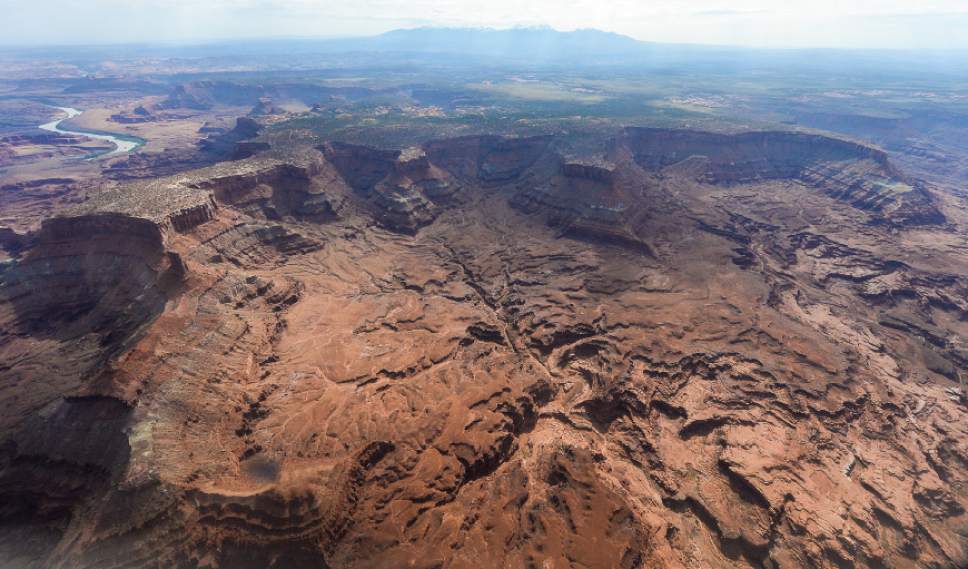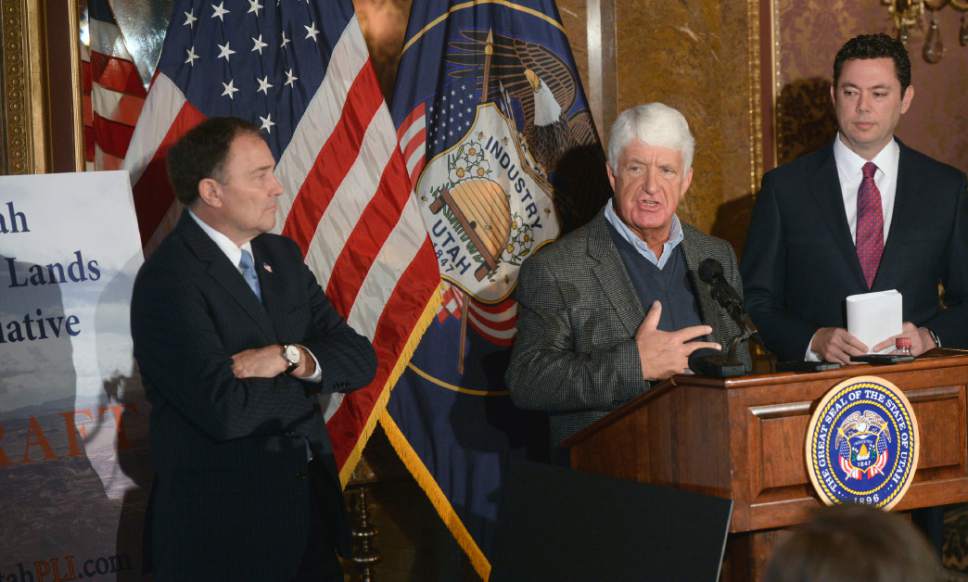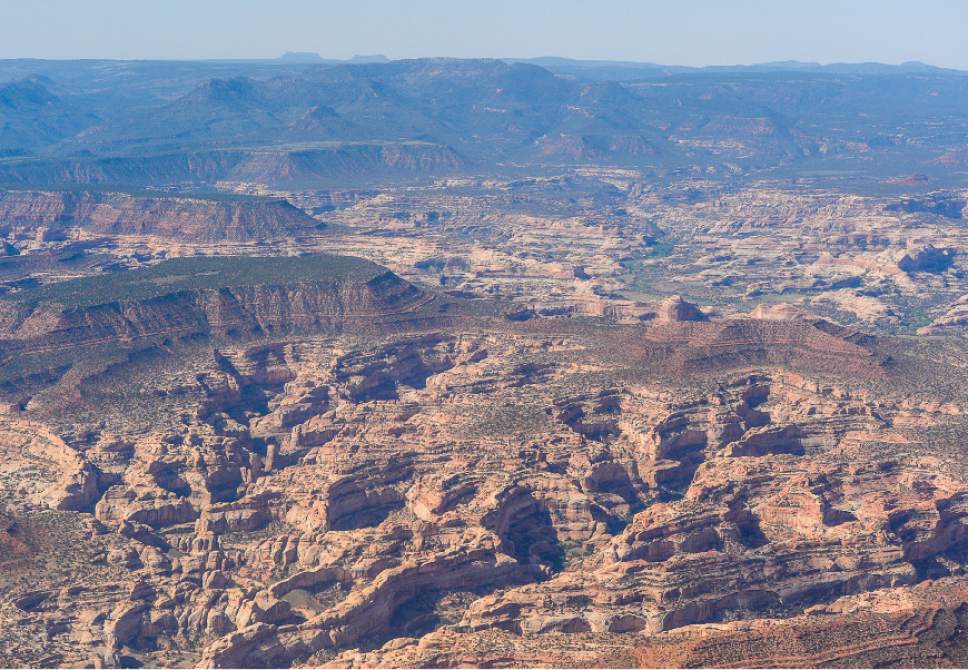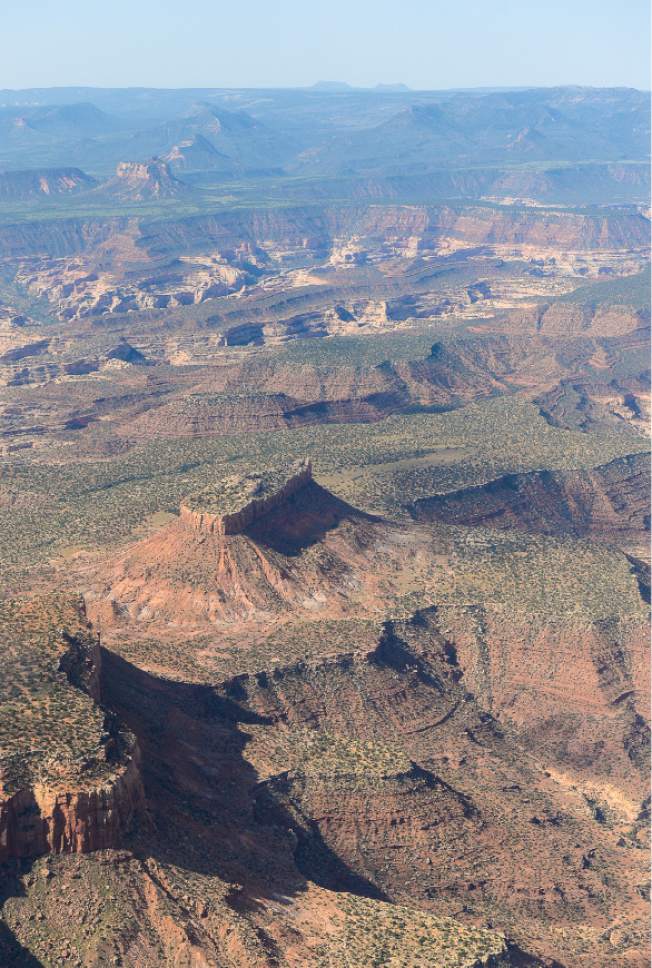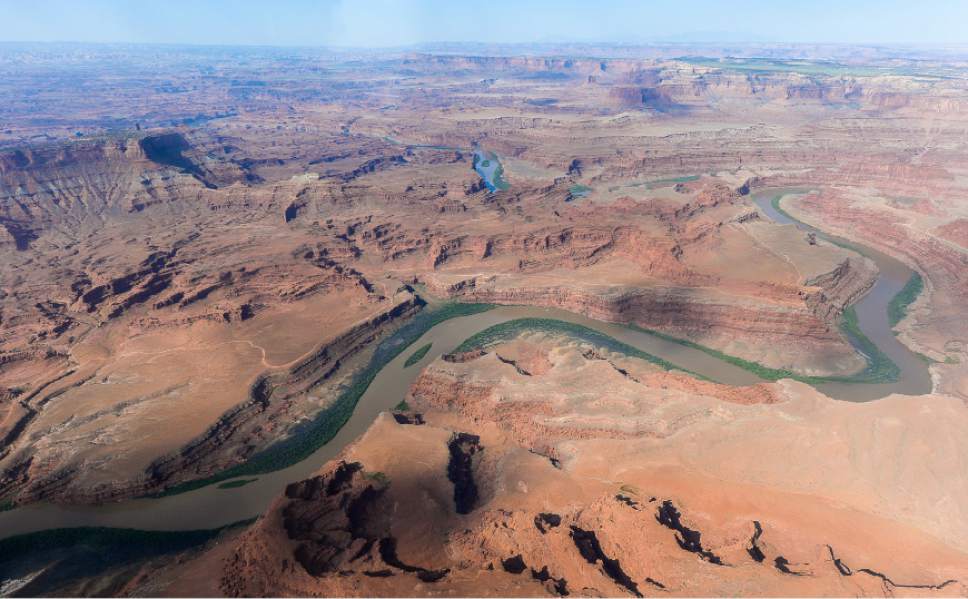This is an archived article that was published on sltrib.com in 2016, and information in the article may be outdated. It is provided only for personal research purposes and may not be reprinted.
Washington • Reps. Rob Bishop and Jason Chaffetz introduced a package of bills Thursday with the immediate hope of preventing President Barack Obama from creating a Bears Ears National Monument in San Juan County.
But the larger goal of the Public Lands Initiative (PLI) is to end decades of acrimony among environmentalists, ranchers, oil and gas drillers, recreationalists and tribal leaders, with a plan that brings certainty to the seven rural counties that took part in this grueling three-year process.
The long-awaited bill, which drew immediate opposition from some environmental groups, would designate about 4.6 million acres of federal land for conservation, open up more than 1.1 million acres for recreation and mineral development, consolidate more than 300,000 acres of state lands and expand Arches National Park by nearly 20,000 acres.
The legislation also would create Jurassic National Monument from the Cleveland-Lloyd dinosaur-fossil quarry. And redesignate 80,000 acres of wilderness study areas for other purposes.
One major difference from a draft proposal released in January is an expanded conservation area in the Bears Ears region, a nod to the tribal groups pushing Obama to use his authority to establish a monument. The original plan added at least some conservation designation to 1.1 million acres around the Bears Ears buttes, considered sacred by the Navajo. The new legislation bumps that to 1.4 million acres and gives tribal leaders more input on how the land is managed.
San Juan County Commissioner Phil Lyman said Thursday that the revised PLI "seems to be shifting away" from his county's proposal "more and more," though that doesn't mean he won't support it.
The increased acreage failed to win over the Bears Ears Inter-Tribal Coalition. Made up of representatives from five sovereign tribal nations, the alliance was quick to denounce the legislation because it would not allow the tribes to actually help manage those acres.
Members of the tribal coalition had sought to work with the Utah lawmakers on the process but have since said they were ignored and have pursued a monument.
"We're back to that, 'Are you taking us seriously?' " said Regina Lopez-Whiteskunk, a co-chairwoman of the coalition and a member of the Ute Mountain Ute Tribal Council. "We're basically going to stay fast and steady on the track we're on now, which is to ask the president to designate [a monument]."
A companion bill would block any president from naming new national monuments or expanding existing ones in seven Utah counties: Summit, Uintah, Duchesne, Carbon, Grand, Emery, and San Juan.
San Juan County Commissioner Rebecca Benally, a Navajo, said talk of the monument has "divided my people."
"People that used to visit each other," she said, "no longer visit or talk to each other because of this."
Bishop, chairman of the House Natural Resources Committee, and Chaffetz, head of the House Oversight and Government Reform Committee, will lead the effort in the House. Bishop promises hearings this September, while Sen. Mike Lee, R-Utah, will offer companion bills in the Senate. The chances that the measure moves forward, with just a few months left this session, remain unclear.
The bill's introduction comes as Interior Secretary Sally Jewell and other federal officials are touring southeastern Utah to look at the Bears Ears region, a culturally sensitive area to many tribal nations.
"While we look forward to continuing conversations about what successful legislation should look like," the Interior Department said in a news release, "the PLI must not erode land managers' authorities to conduct public lands management, and we will be looking for provisions that provide real protections for lands and waters that deserve it, as well as opportunities for cooperative management for tribes."
Jewell will hold a public hearing Saturday in Bluff on the various ideas to preserve the region, which could be a precursor to presidential action on a national monument.
The Utah Republicans behind the compromise proposal urge the White House to let their proposal move forward.
"It would be cavalier and irresponsible for the president to institute a national monument when we have such broad support for PLI," Chaffetz said in an interview, mentioning the backing from "energy developers to environmentalists, from the cattlemen to the county commissions."
Utah congressmen touted supportive statements from several people involved in the process, including Mike Matz, director of U.S. public lands issues for The Pew Charitable Trusts.
"The virtues of the PLI bill," Matz said, "include permanent protection for some of Utah's most spectacular places, a significant funding stream for Utah's schoolchildren, and diverse new economic opportunities for rural Utah communities provided by wilderness designations."
While the group still has some concerns with parts of the bill, Matz said, it supports the "fundamental premise."
Seven major environmental groups quickly issued a joint statement slamming the PLI for giving Utah too much authority over energy development and grazing on public lands.
"The intent of Rep. Bishop's bill is simple: Abandon our public lands to indiscriminate abuse by the oil and gas industry," said Sharon Buccino, director of the land and wildlife program at the Natural Resources Defense Council. "It would open up this iconic Utah landscape to coal mining, tar sands, oil shale, and oil and gas development. That would put local communities and our climate at increased risk. And it would undermine the clean energy future we are already moving to."
The other groups included the Southern Utah Wilderness Alliance, Grand Canyon Trust, The Wilderness Society, Sierra Club, National Parks Conservation Association and the Conservation Lands Foundation.
"This is nothing but an attempt to stop the Bears Ears National Monument designation," said Scott Groene, SUWA's executive director. "President Obama will now see clearly that the Utah delegation is not serious about protecting our important public lands. He should act quickly to do the job himself."
Josh Ewing, executive director of the Friends of Cedar Mesa, which has pushed to preserve the area, said the group was supportive of the process but not necessarily the final product.
"The bill has significant improvements, which we're appreciative of the [congressmen] working with us on," Ewing said. "At the same time, it continues to have some serious issues that we're concerned about that would make it something we can't support in its entirety."
The Center for Western Priorities believes if Congress can't pass this bill in a matter of weeks, Obama should take action.
"Is Congressman Bishop serious about compromise, or running out the clock? Regardless, he is now under serious time pressure," said Jennifer Rokala, the environmental group's executive director. "Unless this bill makes it to the president's desk in a matter of weeks with necessary improvements, it will be incumbent on President Obama to ensure lands in southern Utah are protected after an eight-decade effort."
For his part, Bishop said the PLI's goal was to end the current, untenable divide. A major way to do that, he added, is to provide more local control.
"It's not that the federal government is malicious, but when they own one-third of America, it is just too much to effectively manage from Washington," Bishop said in a statement. "Utah is a public lands state. It has always been, and it always will be. The question is how those public lands are managed. That's where local government has the advantage. PLI takes that premise and builds it to a reality."
Emery County officials would like to see at least one of the provisions become a reality: a Jurassic National Monument.
"There are probably not very many museums in the world that don't have a skeleton that has come out of [the Cleveland-Lloyd quarry], so it really is a jewel in the rough," Commissioner Paul Cowley said. "We've been at it for nearly a decade and we feel that it is a good proposal."
Reporters Robert Gehrke and Matthew Piper contributed to this story.
What the Public Lands Initiative would do
• Create 41 new wilderness areas, including 52,300 acres near Dinosaur National Monument, 175,500 acres in the Book Cliffs, 257,600 acres in Canyonlands and 223,566 acres in Cedar Mesa.
• Form 11 national conservation areas, including 530,400 acres of the San Rafael Swell.
• Free up roughly 80,000 acres of wilderness study areas, including 20,400 acres of Desolation Canyon, for other uses.
• Create sportsmen special-management areas in the Book Cliffs, Desolation Canyon, Nine Mile Canyon and White River areas.
• Expand Arches National Park by 18,800 acres.
• Establish Jurassic National Monument at the Cleveland-Lloyd dinosaur-fossil quarry.
• Create the Bears Ears National Conservation Area.
• Expand the wild and scenic rivers designation to segments of the Colorado, Dolores, Green and San Juan rivers.
• Consolidate school trust lands.
• Shift 10,000 acres from federal to state control to expand Goblin Valley State Park.
• Transfer 13,300 federal acres to create Price Canyon State Forest.
• Designate a right of way through Recapture Canyon.
• Establish a Red Rock Country off-highway vehicle trail in Grand and San Juan counties.
• Seek to speed up permitting for energy-development projects.
• Work to maintain current grazing rights.
• Create the Public Lands Initiative Planning and Implementation Advisory Committee made up of community and government leaders already involved in the negotiations.
• A second bill would block a president's use of the Antiquities Act to create or expand a national monument in these seven counties: Summit, Uintah, Duchesne, Carbon, Grand, Emery and San Juan.


